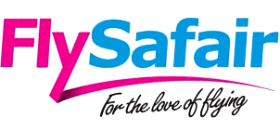 FlySafair Becomes Africa's Largest Boeing 737-800 Operator with Strategic Fleet Growth
FlySafair Becomes Africa's Largest Boeing 737-800 Operator with Strategic Fleet Growth
FlySafair has solidified its position as Africa's dominant Boeing 737-800 operator following the acquisition of two nine-year-old aircraft previously operated by China's Hainan Airlines. The South African carrier now commands a fleet of 34 Boeing 737-800s, representing a strategic expansion that increases both capacity and operational flexibility across the continent's most competitive aviation market.
The timing of this fleet enhancement proves particularly significant as FlySafair emerges from a challenging 12-day pilot strike that disrupted operations throughout July 2025. With the labor dispute now resolved through a comprehensive four-year agreement, the airline's leadership can focus on leveraging these additional aircraft to strengthen market position and expand service offerings across Southern Africa.
Both aircraft arrive as AerCap assets, reflecting the global trend toward aircraft leasing that enables carriers to expand without massive capital investments. This arrangement allows FlySafair to access modern, fuel-efficient aircraft while maintaining financial flexibility—a crucial advantage in Africa's dynamic aviation landscape where economic conditions can shift rapidly.
The fleet expansion delivers a 5.3% increase in passenger capacity, adding 324 seats to FlySafair's total offering. This growth translates to approximately 6,408 total seats across the carrier's 40-aircraft fleet, positioning the airline to capture increased demand as South African tourism rebounds and regional connectivity improves.
Boeing 737-800 specifications make these aircraft particularly well-suited for African operations. With seating for 162 passengers in two-class configuration and a range of approximately 3,000 nautical miles, these workhorses can efficiently serve both high-density domestic routes and emerging regional destinations. The aircraft's proven reliability and widespread maintenance support across Africa reduce operational complexity while maximizing utilization rates.
FlySafair's current network spans 15 destinations, including nine domestic South African cities and six regional points across Southern Africa. Recent route additions include Cape Town to Windhoek service launched in October 2024, marking the carrier's first international route from the Mother City. The airline also introduced Cape Town to Kruger Mpumalanga connections, linking two major tourism hubs that generate significant leisure and business traffic.
The carrier's strategic focus on Boeing 737-800 standardization delivers operational efficiencies that smaller African airlines often struggle to achieve. Pilot training, maintenance procedures, and spare parts inventory become streamlined when operating a single aircraft type, reducing costs and complexity. This approach mirrors successful low-cost carriers worldwide while adapting to African market conditions.
Industry analysts note that FlySafair's expansion comes at a pivotal moment for African aviation. The continent's airlines face pressure from rising fuel costs, currency fluctuations, and infrastructure challenges, yet passenger demand continues growing as economic development accelerates. Fleet modernization and capacity optimization become essential strategies for carriers seeking sustainable growth in this environment.
The recent pilot strike, while disruptive, ultimately strengthened FlySafair's operational foundation through improved labor relations and roster systems. The settlement addressed core concerns about work-life balance and compensation while establishing predictable scheduling that benefits both crew members and operational reliability. This stability proves crucial as the airline deploys additional aircraft across its network.
FlySafair's achievement as Africa's largest Boeing 737-800 operator reflects broader trends in continental aviation. Airlines increasingly recognize that fleet scale and standardization provide competitive advantages in markets where margins remain thin and operational challenges persist. The carrier's 34 Boeing 737-800s compare favorably with major African competitors, many of whom operate mixed fleets that complicate maintenance and training requirements.
Looking ahead, the additional capacity positions FlySafair to capitalize on several emerging opportunities. Regional route development remains a priority, with potential expansion into markets like Botswana, Mozambique, and Madagascar where demand exists but service remains limited. The airline's proven ability to stimulate traffic through competitive pricing could unlock new passenger flows across Southern Africa.
The carrier's domestic network also benefits from increased frequency potential on high-demand routes. The Johannesburg-Cape Town corridor, one of the world's busiest domestic routes, can accommodate additional daily flights during peak periods. Similarly, connections to Durban, Port Elizabeth, and other major cities gain scheduling flexibility that improves passenger convenience and market competitiveness.
Tourism industry implications extend beyond FlySafair's immediate operations. Increased airlift capacity supports South Africa's broader tourism recovery while strengthening regional connectivity that benefits multiple countries. Tour operators, hotels, and destination marketing organizations gain access to expanded passenger flows that drive economic activity across the Southern African region.
The acquisition also demonstrates international confidence in African aviation as global lessors like AerCap continue placing modern aircraft with established carriers. This trend suggests that African airlines with strong operational records and market positions can access competitive financing and equipment despite broader economic challenges facing the continent.
FlySafair's fleet expansion strategy reflects careful market analysis and operational planning that other African carriers might emulate. Rather than pursuing rapid growth across multiple aircraft types, the airline focuses on maximizing efficiency within its chosen segment while building market leadership that creates sustainable competitive advantages.
As African aviation continues evolving, FlySafair's approach offers valuable lessons about balancing growth ambitions with operational realities. The carrier's success in building Africa's largest Boeing 737-800 fleet while maintaining competitive pricing and service quality demonstrates that focused strategies can succeed even in challenging market conditions.
